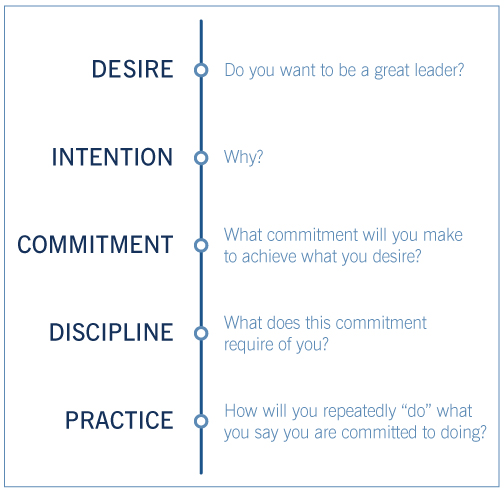“Being” a great leader takes practice. Practice requires discipline. Discipline requires commitment. Sustaining commitment and discipline requires intention and desire. When intention and desire are missing, no matter what you do, you will not be able to sustain your commitment to and desire to be a great leader.
If you find yourself not following through on your practice for being a great leader – not being disciplined, lacking or waning in commitment – then you need to go back and check in on your desire and intention. It’s there that you’ll remind yourself of what you want (to be a great leader) and why you want it. All too often we “want it,” but our intention or “why” is not compelling enough to sustain our practice. If your “why” is not compelling enough, what’s keeping you from having a strong “why”?
I was recently coaching a manager who was getting ready to hire an employee for a new position. He was worried that he didn’t have the time or discipline to be a good manager for this position. He was reflecting on his past and remembering how he wasn’t a great manager back then. I asked him why he thought he needed to hire this position. He proceeded to give me a list of reasons, but I still didn’t hear his compelling reason. Finally, he found it. He grew more intense and said, “If I don’t hire this person, I’ll never be able to reach my sales goals nor will I have the quality of life I want.” (Desire and Intention).
So I then asked, “What are you willing to commit to do to make this position a success?” At first he started naming things that deflated his excitement. “I guess I’ll have to change the whole way I work,” and “I’ll have to communicate more. I’m used to not having to do that. That’s going to be a big change.” Feeling his deflation, I said, “Those are really big commitments. How about finding some smaller steps that don’t feel so big?”
We developed some smaller, incremental steps that he could wholeheartedly get behind. These were things he could 100% commit to and not feel overwhelmed by or like he was repeating his past manager behaviors. His thoughts about what it would take to be successful were keeping him from being able to commit fully to what he wanted. Once we unpackaged his thoughts and replaced them with small, incremental steps, his whole energy and commitment to moving forward shifted. We ended our call with him not only understanding his “why” but having specific steps that he could commit to doing that he knew he could achieve.
Sometimes, it’s hard to find our “why” and unravel those small steps that accelerate our success. Having an objective person sort through this with you isn’t just helpful, it can be priceless! We’re here to help when those moments arise for you.
By Theresa Gale,
PRINCIPAL, TRANSFORM, INC.





